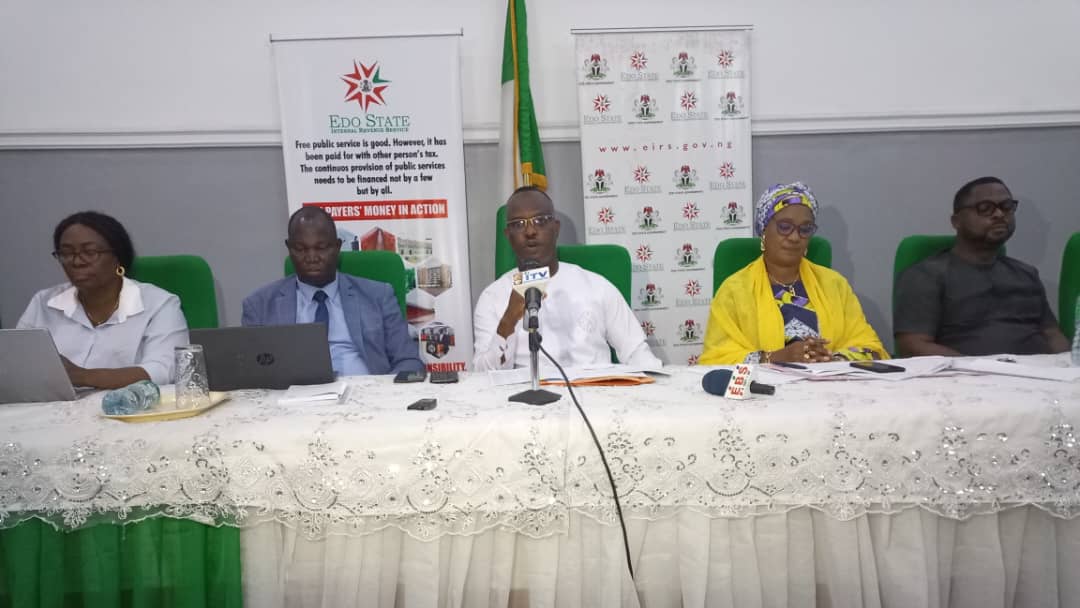The Edo State Internal Revenue Service says it has scaled the IGR growth by 370% in the last eight years. This was revealed by the Chairman, Taskforce on Internally Generated Revenue, Hon. John Osagie Inegbedion FCA, FCTI at the Revenue Service’s Quarterly Performance Review Meeting held on Saturday 19th October, at the EIRS Corporate Head Office.
Hon. Inegbedion while reeling out the records, stated, that the growth rate of 370% represents the sum of N62bn increase in IGR collection in the last eight years from 2016 to 2024 under the effective leadership of Governor Godwin Obaseki.
Inegbedion further stated that the EIRS met and surpassed its 2024 budgetary target in Q3 with N67.29bn as against N55.64bn Year-to-Date IGR budget of 2024, the Revenue Service enabled the State to meeting 50% of Federal Account Allocation Committee (FAAC) receipts from the previous 20%, meeting its monthly recurrent expenditure, projecting a close of N85bn for the year as well as setting a target of N110bn for 2025.
The EIRS boss revealed that as at 2023, Edo was ranked 5th in the country under the sub-national IGR Performance and Ranking in the Federation just below Lagos, Rivers, Ogun and Delta States. A remarkable feat deserving the commendation of the Obaseki led administration.
Attributing the recorded successes, Hon. Inegbedion said the feats would not have been possible but for His Excellency, Godwin Obaseki who ensured that Edo becomes a fiscal stable State, not minding the challenging financial economic environment, the economic policies, investment drive put in place and investment in technology which significantly impacted on the economic growth and prosperity of Edo State, as evidenced by the remarkable growth in IGR.
According to Inegbedion, “For the records, at the inception of the current administration of His Excellency, Godwin Obaseki, the IGR collection for 2016 stood at N23.64bn, 2017 experienced a slight increase with a record of N27.19bn, 2018 recorded N29.62bn, 2019 had a significant increase of N35.2bn. The effect of COVID-19 however reduced the IGR performance to N28.02bn. However, there was a spike in the collection of 2021 amounting to N38.67bn. For 2022 it was N45.06bn and 2023 is was N62.08bn. Currently, as at September, 2024, (Q3), we have recorded N67.29bn as against N55.64bn Year-to-Date IGR budget of 2024.
With an average of N7bn monthly, we project that the Revenue Service will close the 2024 IGR collection year with N85bn.
The growth recorded by this administration in the last eight years is N62bn indicating a growth rate of 370%.
With the established trend, growth rate and financial stability experienced in Edo, the 2025 IGR budget projection is expected to be N110bn to N120bn. This will usher Edo State into N100’s billion group of States IGR.
Prior to date, the IGR to FAAC receipt used to be 20% to 25%. But today, IGR to FAAC is 50%. The economic policies and investment drive of His Excellency Godwin Obaseki have significantly impacted on the economic growth and prosperity of Edo State as evidence by this remarkable growth in IGR.
The deployment of technology in EIRS has tremendously improved the revenue collections, assessment, transparency and accountability of the Service.
As it stands today, the State’s monthly IGR can cater for its monthly recurrent expenditure without any financial worries.
As at 2023, the sub-national IGR Performance and Ranking in the Federation ranked Edo State as 5th in the country just below Lagos, Rivers, Ogun and Delta States. This is a remarkable feat and the administration deserves commendation.
In all of these, kudos must be given to the man that made all these happened- Governor Godwin Obaseki, who ensured that Edo becomes a fiscal stable State not minding the challenging financial economic environment.
Indeed, we can boldly say that Edo is on a stable part of growth and prosperity.”


